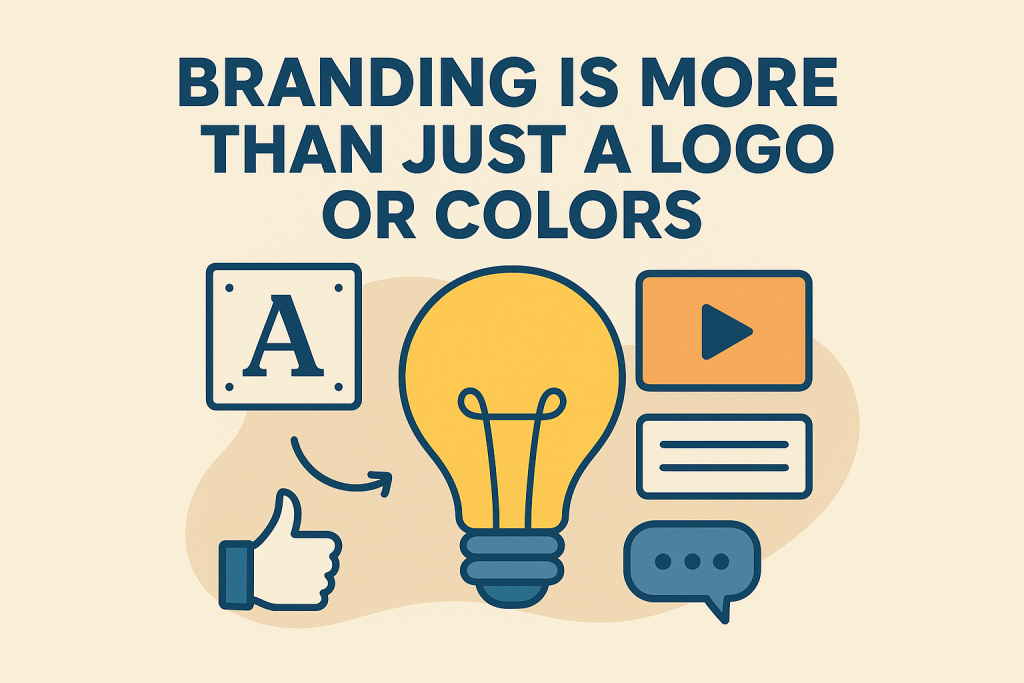Every business wants to grow, but few realize that growth does not start with marketing campaigns or product launches, it starts with branding. Branding is the heartbeat of your business. It is what people say about you when you are not in the room, the impression your colors and tone leave in their minds, and the trust customers place in you long before money changes hands.
Think about the brands you admire: Nike, Apple, Coca-Cola, or even successful local businesses in your community. What makes them different is not just what they sell, but the feeling they create. Branding is the foundation that allows businesses to build loyalty, command respect, and grow beyond transactions. Without it, even great businesses risk blending into the noise.
So, what exactly makes branding so powerful, and why should every business, no matter its size prioritize it? Let’s break it down.
Branding is More Than Just a Logo or Colors.
A common misconception is reducing branding to visuals alone, a logo, some colors, and maybe a catchy tagline. While these are important, branding runs deeper. It is your identity and personality as a business. It is the voice in your emails, the feeling a customer gets when they walk into your store, and the values you represent in the marketplace.
For example, Airbnb does not just sell accommodation, it sells belonging. That is why their branding emphasizes community, experiences, and “feeling at home anywhere in the world.” When you view branding this way, it shifts from being just design work to becoming the soul of your business.

Consistency Builds Recognition and Trust
Customers trust what feels familiar. A consistent brand presence; whether on social media, websites, packaging, or customer interactions makes you recognizable and reliable.
Take Coca-Cola as an example: whether you buy it in Lagos, London, or Los Angeles, the brand experience feels the same; red color, signature script, consistent messaging about happiness and refreshment. This consistency is what builds recognition, and recognition breeds trust.
For smaller businesses, consistency does not require a global budget, it simply means aligning your tone, look, and message across all platforms. If your Instagram says “professional and modern,” but your website feels outdated and confusing, customers will struggle to trust you.
Branding Differentiates You From Competitors
In a world where dozens of businesses may offer similar products, branding is the deciding factor for customers. Think about how many coffee shops exist, but why do millions of people line up at Starbucks? It is not just about coffee; it is the experience. Starbucks positioned itself as a “third place” between home and work; a cozy, welcoming space. That differentiation is pure branding.
For your business, this means identifying your unique promise. What do you offer that competitors cannot? Maybe it is exceptional customer service, maybe it is authenticity, or maybe it is how your product aligns with certain values. Strong branding communicates that difference clearly.
Branding Shapes Perceived Value
Customers often judge quality before even trying a product based purely on branding. That is why people pay premium prices for Apple products. The brand has built an image of sleek design, innovation, and reliability, so customers believe the products are worth more.
If your branding looks cheap or inconsistent, customers may assume your product or service is the same. But if your brand communicates professionalism and care, you can charge more and still retain loyalty. Branding does not just attract customers, it influences how much they are willing to invest in you.
Branding Creates Emotional Connection
The strongest brands do not just sell, they connect emotionally. Nike’s “Just Do It” is not about shoes; it is about ambition, overcoming challenges, and pushing yourself. This emotional connection is why people buy into the brand even when they already own five pairs of sneakers.
Customers remember how you made them feel more than the details of what you sold. Strong branding taps into those emotions, turning buyers into loyal advocates.
At its core, branding is not about aesthetics, it is about identity, trust, and connection. It is the silent ambassador of your business, shaping perceptions long before you even speak. A weak brand forces you to fight harder for every sale, while a strong brand makes customers seek you out, trust you, and recommend you.
So, if you are building a business today, ask yourself: What do I want people to feel, think, and say about us? That answer should guide your branding decisions.
Because in the end, businesses that master branding do not just sell products, they build legacies.